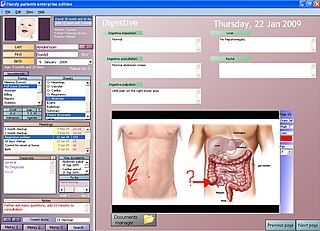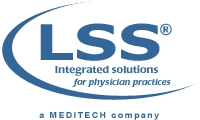Professional certification, trade certification, or professional designation, often called simply certification or qualification, is a designation earned by a person to assure qualification to perform a job or task. Not all certifications that use post-nominal letters are an acknowledgement of educational achievement, or an agency appointed to safeguard the public interest.

Health informatics is the field of science and engineering that aims at developing methods and technologies for the acquisition, processing, and study of patient data, which can come from different sources and modalities, such as electronic health records, diagnostic test results, medical scans. The health domain provides an extremely wide variety of problems that can be tackled using computational techniques.

An electronic health record (EHR) is the systematized collection of patient and population electronically stored health information in a digital format. These records can be shared across different health care settings. Records are shared through network-connected, enterprise-wide information systems or other information networks and exchanges. EHRs may include a range of data, including demographics, medical history, medication and allergies, immunization status, laboratory test results, radiology images, vital signs, personal statistics like age and weight, and billing information.
ISACA is an international professional association focused on IT governance. On its IRS filings, it is known as the Information Systems Audit and Control Association, although ISACA now goes by its acronym only. ISACA currently offers 8 certification program as well as other micro-certificates.
The Oracle Certification Program certifies candidates on skills and knowledge related to Oracle products and technologies.

A medical laboratory scientist (MLS) or clinical laboratory scientist (CLS) or medical technologist (MT) performs diagnostic testing of blood and body fluids in clinical laboratories. The scope of a medical laboratory scientist's work begins with the receipt of patient or client specimens and terminates with the delivery of test results to physicians and other healthcare providers. The utility of clinical diagnostic testing relies squarely on the validity of test methodology. To this end, much of the work done by medical laboratory scientists involves ensuring specimen quality, interpreting test results, data-logging, testing control products, performing calibration, maintenance, validation, and troubleshooting of instrumentation as well as performing statistical analyses to verify the accuracy and repeatability of testing. Medical laboratory scientists may also assist healthcare providers with test selection and specimen collection and are responsible for prompt verbal delivery of critical lab results. An estimated 70% of medical decisions are based on laboratory test results and MLS contributions affect 95% of a health system's costs.

The College of Healthcare Information Management Executives (CHIME) is a professional organization for chief information officers and other senior healthcare IT leaders. CHIME enables its members and business partners to collaborate; exchange ideas and technology; develop professionally; and advocate the effective use of information management to improve the health and healthcare in the communities they serve.
A biomedical engineering/equipment technician/technologist or biomedical engineering/equipment specialist is typically an electro-mechanical technician or technologist who ensures that medical equipment is well-maintained, properly configured, and safely functional. In healthcare environments, BMETs often work with or officiate as a biomedical and/or clinical engineer, since the career field has no legal distinction between engineers and engineering technicians/technologists.
The Certification Commission for Health Information Technology (CCHIT) was an independent, 501(c)3 nonprofit organization with the public mission of accelerating adoption of robust, interoperable health information technology in the United States. The Commission certified electronic health record technology (EHR) from 2006 until 2014. It was approved by the Office of the National Coordinator for Health Information Technology (ONC) of the U.S. Department of Health and Human Services (HHS) as an Authorized Testing and Certification Body (ONC-ATCB). The CCHIT Certified program is an independently developed certification that includes a rigorous inspection of an EHR's integrated functionality, interoperability and security using criteria developed by CCHIT's broadly representative, expert work groups. These products may also be certified in the ONC-ATCB certification program.
Health information management (HIM) is information management applied to health and health care. It is the practice of analyzing and protecting digital and traditional medical information vital to providing quality patient care. With the widespread computerization of health records, traditional (paper-based) records are being replaced with electronic health records (EHRs). The tools of health informatics and health information technology are continually improving to bring greater efficiency to information management in the health care sector.
The following outline is provided as an overview of and topical guide to information technology:

The European Institute for Health Records or EuroRec Institute is a non-profit organization founded in 2002 as part of the ProRec initiative. On 13 May 2003, the institute was established as a non-profit organization under French law. Current President of EuroRec is Prof. Dipak Kalra. The institute is involved in the promotion of high quality Electronic Health Record systems in the European Union. One of the main missions of the institute is to support, as the European authorised certification body, EHRs certification development, testing and assessment by defining functional and other criteria.
The Office of the National Coordinator for Health Information Technology (ONC) is a staff division of the Office of the Secretary, within the U.S. Department of Health and Human Services. ONC leads national health IT efforts, charged as the principal federal entity to coordinate nationwide efforts to implement and use the most advanced health information technology and the electronic exchange of health information.
DrChrono is an American digital health technology company providing a software and billing service platform consisting of Web- and cloud-based apps for doctors and patients. It makes electronic health records (EHR), practice management software and medical billing software available digitally and provides medical revenue cycle management (RCM) services. The company is based in Sunnyvale, California

LSS Data Systems (LSS), was a Minnesota-based medical software and service company that develops products for the physician practice community. LSS was founded in 1982, and since then was a partner of Medical Information Technology (MEDITECH), developing physician practice management and ambulatory electronic health record software. In 2000 and 2001 MEDITECH invested in LSS and in February 2011, acquired complete ownership. LSS became a wholly owned subsidiary of the Massachusetts based company, and announced completion of the merger on January 1, 2014.
The Computing Technology Industry Association (CompTIA) is an American non-profit trade association, issuing professional certifications for the information technology (IT) industry. It is considered one of the IT industry's top trade associations. Based in Downers Grove, Illinois, CompTIA issues vendor-neutral professional certifications in over 120 countries. The organization releases over 50 industry studies annually to track industry trends and changes. Over 2.2 million people have earned CompTIA certifications since the association was established.
The Health Information Technology for Economic and Clinical Health Act, abbreviated the HITECH Act, was enacted under Title XIII of the American Recovery and Reinvestment Act of 2009. Under the HITECH Act, the United States Department of Health and Human Services resolved to spend $25.9 billion to promote and expand the adoption of health information technology. The Washington Post reported the inclusion of "as much as $36.5 billion in spending to create a nationwide network of electronic health records." At the time it was enacted, it was considered "the most important piece of health care legislation to be passed in the last 20 to 30 years" and the "foundation for health care reform."
A medical scribe is a person, or paraprofessional, who specializes in charting physician-patient encounters in real time, such as during medical examinations. They also locate information and patients for physicians and complete forms needed for patient care. Depending on which area of practice the scribe works in, the position may also be called clinical scribe, ER scribe or ED scribe, or just scribe. A scribe is trained in health information management and the use of health information technology to support it. A scribe can work on-site or remotely from a HIPAA-secure facility. Medical scribes who work at an off-site location are known as virtual medical scribes.

Kareo is a company based in Irvine, California that provides software as a service for independent medical practices. The company offers cloud computing products and services for electronic health record (EHR) management, medical practice management software, managed billing services and software to help practices engage with their patients. In 2019, the company reported over 55,000 providers using its technology.
Federal and state governments, insurance companies and other large medical institutions are heavily promoting the adoption of electronic health records. The US Congress included a formula of both incentives and penalties for EMR/EHR adoption versus continued use of paper records as part of the Health Information Technology for Economic and Clinical Health (HITECH) Act, enacted as part of the, American Recovery and Reinvestment Act of 2009.






